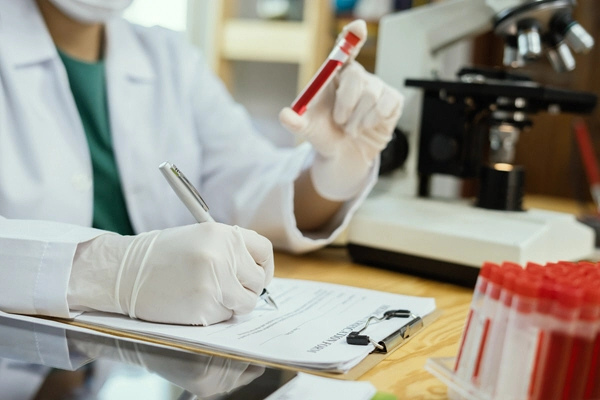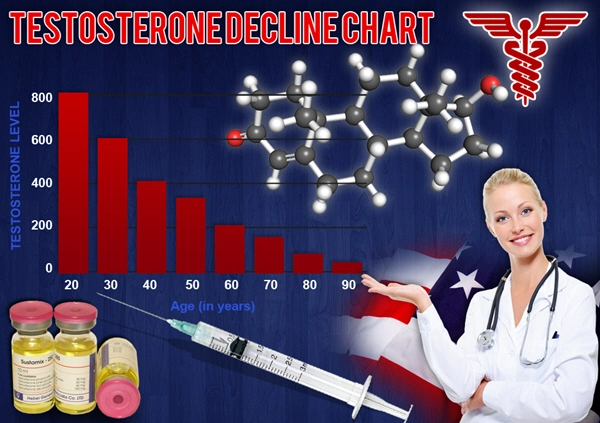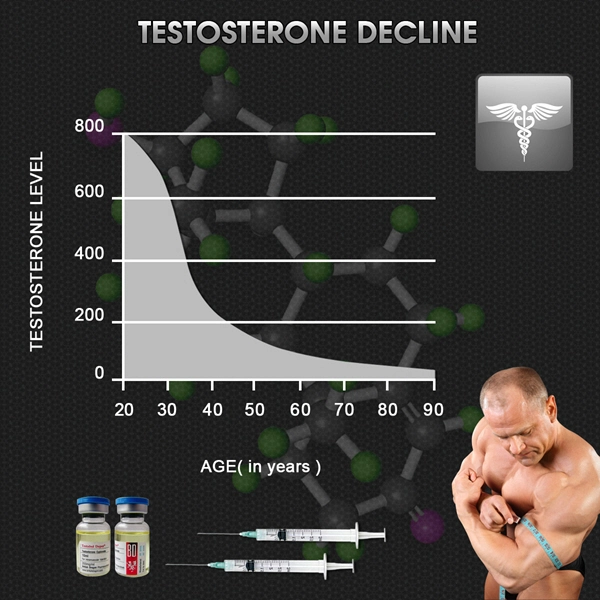Introduction
Non-bacterial prostatitis, a condition characterized by chronic pelvic pain and urinary symptoms without evidence of bacterial infection, poses a significant challenge in men's urological health. Recent research has begun to unravel the complex interplay between hypogonadism, a condition marked by low testosterone levels, and non-bacterial prostatitis. This article delves into the inflammatory mediator profiles associated with this condition in hypogonadal men and explores the potential therapeutic benefits of testosterone therapy.
Understanding Non-Bacterial Prostatitis
Non-bacterial prostatitis, also known as chronic pelvic pain syndrome (CPPS), affects a substantial number of American men, leading to discomfort and a diminished quality of life. The etiology of this condition remains elusive, but it is believed to involve a multifactorial process, including neurogenic, psychological, and immunological factors. In hypogonadal men, the scenario becomes even more complex, as low testosterone levels may exacerbate the inflammatory response within the prostate.
Inflammatory Mediators in Hypogonadal Men
Research has shown that hypogonadal men with non-bacterial prostatitis exhibit distinct profiles of inflammatory mediators. Studies have identified elevated levels of cytokines such as interleukin-6 (IL-6), interleukin-8 (IL-8), and tumor necrosis factor-alpha (TNF-α) in the prostatic fluid of these patients. These mediators contribute to the perpetuation of inflammation and may be responsible for the persistent symptoms observed in this population.
Furthermore, the presence of these inflammatory markers is not only a hallmark of the disease but also a potential target for therapeutic intervention. Understanding the specific inflammatory mediator profiles in hypogonadal men with non-bacterial prostatitis can guide the development of tailored treatment strategies.
The Role of Testosterone Therapy
Testosterone therapy has emerged as a promising avenue for managing non-bacterial prostatitis in hypogonadal men. By addressing the underlying hormonal deficiency, testosterone supplementation may help modulate the inflammatory response within the prostate. Clinical studies have demonstrated that testosterone therapy can lead to a reduction in prostatic inflammation and an improvement in symptoms associated with non-bacterial prostatitis.
One study found that after six months of testosterone therapy, hypogonadal men with non-bacterial prostatitis experienced a significant decrease in IL-6 and IL-8 levels in their prostatic fluid. This reduction in inflammatory mediators was accompanied by a notable improvement in pain scores and urinary symptoms, suggesting a direct link between testosterone levels and the inflammatory process in the prostate.
Clinical Implications and Future Directions
The findings on the relationship between hypogonadism, inflammatory mediators, and non-bacterial prostatitis have important clinical implications. For American men suffering from this condition, a comprehensive evaluation of their hormonal status may be warranted. Identifying hypogonadism as a contributing factor can open the door to targeted interventions, such as testosterone therapy, which may offer relief from the debilitating symptoms of non-bacterial prostatitis.
Moving forward, further research is needed to elucidate the precise mechanisms by which testosterone modulates the inflammatory response in the prostate. Longitudinal studies assessing the long-term effects of testosterone therapy on non-bacterial prostatitis in hypogonadal men will be crucial in establishing its role as a standard treatment option.
Conclusion
Non-bacterial prostatitis in hypogonadal men represents a unique clinical entity characterized by distinct inflammatory mediator profiles. The potential of testosterone therapy to alleviate symptoms and reduce inflammation offers hope for improved management of this condition. As research continues to shed light on the complex interplay between hormones and prostate health, American men can look forward to more effective and personalized treatment strategies for non-bacterial prostatitis.

- Unraveling the Role of Phosphodiesterase Type 5 in Prostatic Health: Insights into Androgen Regulation and Urological Therapy for American Men [Last Updated On: February 20th, 2025] [Originally Added On: February 20th, 2025]
- Unveiling Testosterone's Impact on Bladder Health Through Electron Microscopy Studies [Last Updated On: March 7th, 2025] [Originally Added On: March 7th, 2025]
- Alpha1-Adrenoreceptor Density, Testosterone, and LUTS Severity in American Men: A Comprehensive Analysis [Last Updated On: March 8th, 2025] [Originally Added On: March 8th, 2025]
- Understanding Urethral Atrophy in Men: Implications, Diagnosis, and Hormone Therapy Options [Last Updated On: March 8th, 2025] [Originally Added On: March 8th, 2025]
- Understanding Prostate Stroma Composition: Implications of Testosterone Normalization on Collagen and Elastin [Last Updated On: March 9th, 2025] [Originally Added On: March 9th, 2025]
- Unveiling the Role of Prostatic Acid Phosphatase in Monitoring Androgen Activity During Testosterone Replacement Therapy [Last Updated On: March 12th, 2025] [Originally Added On: March 12th, 2025]
- Exploring the Impact of Hormone Replacement on Pelvic Floor Function in Hypogonadal Men [Last Updated On: March 12th, 2025] [Originally Added On: March 12th, 2025]
- Exploring Post-Void Residual Volume Changes in Men with Low Testosterone: A Longitudinal Study on Hormone Replacement Therapy [Last Updated On: March 13th, 2025] [Originally Added On: March 13th, 2025]
- Exploring Urinary Proteomics: Unveiling Biomarkers for Lower Urinary Tract Dysfunction in Androgen-Deficient American Men [Last Updated On: March 15th, 2025] [Originally Added On: March 15th, 2025]
- Urinary Flow Cytometry in Hypogonadal Men: Pre- and Post-TRT Cellular Profiles [Last Updated On: March 16th, 2025] [Originally Added On: March 16th, 2025]
- Metabolomic Analysis of Prostatic Fluid in Testosterone-Deficient Men: Urological Insights and Implications [Last Updated On: March 17th, 2025] [Originally Added On: March 17th, 2025]
- TRT's Impact on Prostatic Blood Flow: Insights from Color Doppler Ultrasonography [Last Updated On: March 17th, 2025] [Originally Added On: March 17th, 2025]
- Prostatic Aromatase Activity and Estradiol-Mediated Hyperplasia in Aging Men on TRT [Last Updated On: March 19th, 2025] [Originally Added On: March 19th, 2025]
- Testosterone Deficiency Impacts Mitochondrial Function in Bladder Smooth Muscle of American Men [Last Updated On: March 19th, 2025] [Originally Added On: March 19th, 2025]
- Bladder Wall Thickness Correlates with Urodynamic Parameters in Men with Late-Onset Hypogonadism [Last Updated On: March 20th, 2025] [Originally Added On: March 20th, 2025]
- VUR in Hypogonadal Men: Bladder Neck Dysfunction and Hormonal Impacts [Last Updated On: March 20th, 2025] [Originally Added On: March 20th, 2025]
- Neural Density in Detrusor Muscle: Hypogonadism's Impact on Bladder Function in Men [Last Updated On: March 20th, 2025] [Originally Added On: March 20th, 2025]
- Testosterone Deficiency and Increased Kidney Stone Risk: Urine Sediment Analysis [Last Updated On: March 21st, 2025] [Originally Added On: March 21st, 2025]
- Androgen Therapy Enhances Urethral Pressure in Hypogonadal Men: UPP Insights [Last Updated On: March 21st, 2025] [Originally Added On: March 21st, 2025]
- HRT Impact on Urothelial Gene Expression in American Men: A Transcriptomic Analysis [Last Updated On: March 21st, 2025] [Originally Added On: March 21st, 2025]
- Testosterone Therapy: Monitoring PSA Kinetics and Safety Protocols for Prostate Health [Last Updated On: March 21st, 2025] [Originally Added On: March 21st, 2025]
- Androgen Deficiency Impact on Prostatic Neuroendocrine Cells in American Men: HRT Response [Last Updated On: March 22nd, 2025] [Originally Added On: March 22nd, 2025]
- Prostatic Inflammation in Hypogonadal Men: Histopathology and Testosterone Therapy Insights [Last Updated On: March 22nd, 2025] [Originally Added On: March 22nd, 2025]
- TRT's Impact on Prostate Health: Insights from Transrectal Shear Wave Elastography [Last Updated On: March 22nd, 2025] [Originally Added On: March 22nd, 2025]
- Uroflowmetry and Hormonal Levels in American Men with Androgen Deficiency: A Correlation Study [Last Updated On: March 23rd, 2025] [Originally Added On: March 23rd, 2025]
- Testosterone Therapy's Impact on Prostatic Stromal-Epithelial Ratio in Hypogonadal Men [Last Updated On: March 23rd, 2025] [Originally Added On: March 23rd, 2025]
- Testosterone's Impact on Prostate Health via Gap Junction Proteins: American Men's Focus [Last Updated On: March 23rd, 2025] [Originally Added On: March 23rd, 2025]
- Quantitative Assessment of Autonomic Innervation in Testosterone-Deficient Neuropathy: Urological Insights [Last Updated On: March 23rd, 2025] [Originally Added On: March 23rd, 2025]
- LOH Impact on Bladder Compliance: Urodynamic and Hormonal Insights for American Males [Last Updated On: March 23rd, 2025] [Originally Added On: March 23rd, 2025]
- Urinary Exosomal microRNAs: Biomarkers for Hypogonadism and LUTS in American Men [Last Updated On: March 24th, 2025] [Originally Added On: March 24th, 2025]
- Prostatic Calcifications in Hypogonadal Men: Prevalence, Composition, and LUTS Association [Last Updated On: March 24th, 2025] [Originally Added On: March 24th, 2025]
- Androgen Deficiency Impacts Bladder Contractility in American Men: Proteomic Insights [Last Updated On: March 24th, 2025] [Originally Added On: March 24th, 2025]
- ART Modulates Apoptotic Index in Prostatic Epithelium of Hypogonadal Men [Last Updated On: March 24th, 2025] [Originally Added On: March 24th, 2025]
- Androgen Receptor Distribution in Hypogonadal Men's Lower Urinary Tract: Immunohistochemical Insights [Last Updated On: March 25th, 2025] [Originally Added On: March 25th, 2025]
- Testosterone's Influence on Bladder ECM Composition in Men: GAGs and Proteoglycans [Last Updated On: March 25th, 2025] [Originally Added On: March 25th, 2025]
- Testosterone Therapy's Impact on Prostate Health: A Histomorphometric Analysis [Last Updated On: March 25th, 2025] [Originally Added On: March 25th, 2025]
- AUM Insights: Testosterone Deficiency and Detrusor Activity in Men [Last Updated On: March 25th, 2025] [Originally Added On: March 25th, 2025]
- TRT's Impact on Prostatic Smooth Muscle: Electron Microscopy Insights [Last Updated On: March 25th, 2025] [Originally Added On: March 25th, 2025]
- Neurophysiological Impact of Testosterone Therapy on Bladder Sensory Afferents in Men [Last Updated On: March 25th, 2025] [Originally Added On: March 25th, 2025]
- TRT Impact on Uroflowmetric Parameters and Serum Hormones in American Males [Last Updated On: March 25th, 2025] [Originally Added On: March 25th, 2025]
- Prostatic Urothelial Metaplasia in Hypogonadism: Prevalence, Pathophysiology, and Testosterone Therapy Reversal [Last Updated On: March 25th, 2025] [Originally Added On: March 25th, 2025]
- Testosterone Fluctuations and Maximum Flow Rate Variability in Hypogonadal Men on TRT [Last Updated On: March 26th, 2025] [Originally Added On: March 26th, 2025]
- Doppler Ultrasonography Monitors Prostatic Flow Changes in Men on TRT [Last Updated On: March 26th, 2025] [Originally Added On: March 26th, 2025]
- PSMA Expression Dynamics in Androgen-Deficient Men Pre- and Post-ART: A Quantitative Analysis [Last Updated On: March 26th, 2025] [Originally Added On: March 26th, 2025]
- Mapping Prostatic Stromal ARs in Men with LUTS: Insights and Therapeutic Implications [Last Updated On: March 26th, 2025] [Originally Added On: March 26th, 2025]
- Testosterone Deficiency Impacts Bladder Function: Insights from Filling Cystometry [Last Updated On: March 27th, 2025] [Originally Added On: March 27th, 2025]
- Testosterone Therapy's Impact on Prostatic Growth Factors and BPH Risk in American Men [Last Updated On: March 27th, 2025] [Originally Added On: March 27th, 2025]
- Urodynamic Insights and Hormone Therapy for Detrusor Overactivity in Testosterone-Deficient Men [Last Updated On: March 27th, 2025] [Originally Added On: March 27th, 2025]
- Hormone Therapy Benefits for Postvoid Dribbling in Testosterone-Deficient American Men [Last Updated On: March 27th, 2025] [Originally Added On: March 27th, 2025]
- DSD in Androgen-Deficient Men: Prevalence, Urodynamics, and Hormonal Management [Last Updated On: March 27th, 2025] [Originally Added On: March 27th, 2025]
- Urethral Sphincter EMG in Hypogonadal Men: Testosterone's Impact on Urinary Function [Last Updated On: March 27th, 2025] [Originally Added On: March 27th, 2025]
- PIN Incidence and Monitoring in Hypogonadal Men on Testosterone Therapy [Last Updated On: March 27th, 2025] [Originally Added On: March 27th, 2025]
- Biochemical Impact of Testosterone Deficiency on Prostatic Secretions in American Males [Last Updated On: March 27th, 2025] [Originally Added On: March 27th, 2025]
- Hypogonadism's Impact on Bladder Neck Collagen and Urodynamics in American Men [Last Updated On: March 28th, 2025] [Originally Added On: March 28th, 2025]
- Bladder Sensation Mapping in Testosterone-Deficient Men: QST Before and After Hormone Therapy [Last Updated On: March 28th, 2025] [Originally Added On: March 28th, 2025]
- Nocturnal Polyuria in Testosterone-Deficient Men: Pathophysiology and Hormone Therapy Benefits [Last Updated On: March 28th, 2025] [Originally Added On: March 28th, 2025]
- TRT Improves Micturition Parameters in Hypogonadal American Men: A Study [Last Updated On: March 29th, 2025] [Originally Added On: March 29th, 2025]
- Neurogenic Bladder in Hypogonadal Men with Metabolic Syndrome: Urodynamic and Hormonal Insights [Last Updated On: March 29th, 2025] [Originally Added On: March 29th, 2025]
- Testosterone Therapy Enhances Detrusor Oxygenation in Androgen-Deficient Men: Polarographic Insights [Last Updated On: March 31st, 2025] [Originally Added On: March 31st, 2025]
- TRT Enhances Urethral Function in Hypogonadal Men: UPP Analysis Insights [Last Updated On: April 1st, 2025] [Originally Added On: April 1st, 2025]
- 3D-TRUS: Monitoring Prostate Health in American Men on Testosterone Therapy [Last Updated On: April 1st, 2025] [Originally Added On: April 1st, 2025]
- Estrogen-Mediated LUTS in Aging Men: Role of Prostatic Stromal Aromatase [Last Updated On: April 3rd, 2025] [Originally Added On: April 3rd, 2025]
- Testosterone Deficiency and Bladder Function: Impact and Improvement via HRT [Last Updated On: April 5th, 2025] [Originally Added On: April 5th, 2025]
- Testosterone Deficiency Impacts Bladder Myofibroblast Activity: Immunohistochemical Insights [Last Updated On: April 5th, 2025] [Originally Added On: April 5th, 2025]
- Prostatic Elastography: Monitoring Prostate Health in American Men on Testosterone Therapy [Last Updated On: April 6th, 2025] [Originally Added On: April 6th, 2025]
- Diurnal LUTS Variations in Hypogonadal Men Linked to Testosterone Rhythms [Last Updated On: April 6th, 2025] [Originally Added On: April 6th, 2025]
- Bladder Wall Fibrosis in Men: Grading and Hormone Therapy Benefits [Last Updated On: April 7th, 2025] [Originally Added On: April 7th, 2025]
- Revolutionizing Prostatic Health: Novel Techniques in Androgen Receptor Sensitivity Assessment [Last Updated On: April 8th, 2025] [Originally Added On: April 8th, 2025]
- Differentiating Prostatitis Symptoms in Hypogonadal Men: Benefits of Testosterone Therapy [Last Updated On: April 8th, 2025] [Originally Added On: April 8th, 2025]
- Intraprostatic T and DHT Levels in American Males Undergoing TRT: Insights and Management [Last Updated On: April 10th, 2025] [Originally Added On: April 10th, 2025]
- Testosterone's Impact on Prostatic Autophagy in Hypogonadal Men: TRT Effects [Last Updated On: April 11th, 2025] [Originally Added On: April 11th, 2025]
- OAB in American Men with Low Testosterone: Prevalence, Symptoms, and TRT Benefits [Last Updated On: April 11th, 2025] [Originally Added On: April 11th, 2025]
- Testosterone Deficiency and Bladder Afferent Nerve Activity: Electrophysiological Insights [Last Updated On: April 11th, 2025] [Originally Added On: April 11th, 2025]
- Predicting Prostatic Growth in American Men on TRT Using Mathematical Modeling [Last Updated On: April 12th, 2025] [Originally Added On: April 12th, 2025]
- TRT Enhances Periurethral Vascularity in American Men: Power Doppler Insights [Last Updated On: April 13th, 2025] [Originally Added On: April 13th, 2025]
- Urinary NGF: A Biomarker for LUTS in Testosterone-Deficient Men [Last Updated On: April 16th, 2025] [Originally Added On: April 16th, 2025]
- BIA: A Revolutionary Tool for Monitoring Prostate Health in Men on TRT [Last Updated On: April 16th, 2025] [Originally Added On: April 16th, 2025]
- PSSC Activity and BPH Risk in Hypogonadal Men on Testosterone Therapy [Last Updated On: April 17th, 2025] [Originally Added On: April 17th, 2025]
- CEUS Insights into Urethral Vasocongestion in Hypogonadal Men: Clinical Advances [Last Updated On: April 17th, 2025] [Originally Added On: April 17th, 2025]
- 3D Histopathology Reveals Chronic Prostate Inflammation Patterns in Hypogonadal American Men [Last Updated On: April 17th, 2025] [Originally Added On: April 17th, 2025]



List of USA state clinics - click a flag below for blood testing clinics.
Word Count: 551


















































